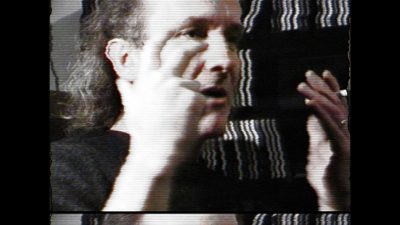Scene 1: Mike
Alan Zweig (offscreen voice): …from books, movies and records, made me feel less guilty about it in that he said: look, maybe those things are just not available in our world and so this is the place to get them. So I started to think that’s true…
Mike Cartmell (onscreen, sync): What things are not available? Emotional experiences? Emotional experiences in an encounter with another living person are more authentic than emotional experiences in an encounter with somebody blowing a horn 25 years ago that’s been somehow digitally encoded on a piece of plastic? That’s fucking bullshit. That’s bullshit.
Scene 2: Swimming Pool
voice 2:
One of the obstacles is the demand that we be happy and enjoy our lives. I think it’s a huge distraction.
If somebody can satisfy you, they can also frustrate you.
How can we stand the fact that the people we love and hate
are the people we love and hate?
What we’re continuously being sold are possibilities for pleasure.
And what we’re starved of now is frustration.
There isn’t a really powerful account of the value of frustration.
It’s as though we’re afraid of frustration.
As soon as frustration shows up, it’s got to be filled with something.
It’s a bit like the mother who overfeeds her child.
She does that to stop the child from having appetite.
Because the appetite is so frightening.
The culture shuts down appetite, which also shuts down
people’s capacity to
Mike (sync): You think that Coleman Hawkins on that CD or vinyl isn’t a person. Yes he is. That’s a person. That’s an engagement with another consciousness. You can’t say, “Well Coleman, why did you go to a G flat there when anybody else wouldn’t have. You can’t engage in that way. But if you listen to that thing 25 times with a keen ear and some intelligence you’d know something about what is grave and constant in human nature.
Scene 3: Jazz
voice over: Other jazz greats will drop in, they always do. This is where and how they get their kicks. Now true, this is play without pay but jazz musicians live for this moment. For them it’s as essential as breathing. It’s their lifeblood.
Well, look who just made the scene. Coleman Hawkins, a jazz pioneer of incomparable stature. The Hawk was the very first jazz man who attained fame on the tenor sax and although his role has been challenged many times during the past 40 years, in our book Coleman Hawkins is still the champ.
Coleman Hawkins: Let’s do a little Lover Man.
